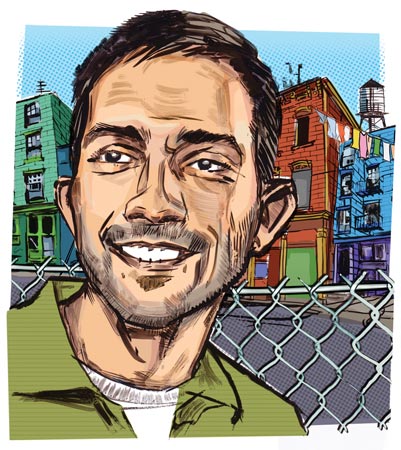How role-playing helped me become a more compassionate nurse
By Lucas Fussell
 On April 23, 2010, my family and I were exhausted from a week of working, rushing from agency to agency looking for assistance, having our house burglarized, and trying to hold our family together through some financially troubling times. I’d lost my computer engineering job four months before, my unemployment checks had run out, and my wife’s income from General Hospital was nowhere near sufficient to cover the mortgage, utilities, food, and other necessities of our family of five.
On April 23, 2010, my family and I were exhausted from a week of working, rushing from agency to agency looking for assistance, having our house burglarized, and trying to hold our family together through some financially troubling times. I’d lost my computer engineering job four months before, my unemployment checks had run out, and my wife’s income from General Hospital was nowhere near sufficient to cover the mortgage, utilities, food, and other necessities of our family of five.
I am fortunate, however that this was actually the experience of Charles Chen, a character I played in a Poverty Simulation at the Johns Hopkins University School of Nursing. Unfortunately, there are many real-life Charles Chens who struggle every day to make ends meet and live a healthy life.
In my real life—as Lucas Fussell—I was raised primarily by my father and grew up in various low-income family situations which at times found us living well below the federally established poverty line. Many times we knew of no resources to help us other than family, and even that was never guaranteed.
These memories are with me every day, but they were brought to the forefront of my thoughts during the week preceding the simulation. I was curious to see how the program would simulate the stress and anxiety associated with poverty, the memory of which can never be erased.
During the simulation, participants role-played being family members living in poverty. Each family was given resources such as identification cards, cash, and details of the monthly budget. The “homes” were groupings of tables situated in the middle of the room while tables representing community agencies like grocery stores, banks, employers, schools, and check cashing companies were arranged around the perimeter. Most of the “agencies” were staffed by volunteers who have real-life experience with poverty and the realities of living in East Baltimore. Their intimate knowledge of poor and vulnerable communities lent an air of authenticity to the event.
In my role as Charles Chen, I began to experience some anxiety, tension, and fear. I ran between the Department of Family Services, the bank, a check cashing business, the police department, school, utility companies, a community action agency, and other stations, all while working with my “wife” to manage a family with three children. It was stressful, and the stress was still palpable for a time after the simulation ended.
Afterwards I began to recall how the sustained stress of poverty had affected me growing up. I felt that there was no way I could sustain my current life with this ever-present level of stress. I would be a physical and emotional wreck before the month was out. It was at this point that I knew that the simulation had accomplished its mission of making the participants—particularly future healthcare professionals—aware of the hazards of poverty and stress that we may forget because they are not as visible as hunger or homelessness.
To bring about change with our patients and in our communities, we must realize that the majority of the power for change lies in the hands of the ones reaching out to us. Our patients and our communities trust us to do what is best for them. Many times we find in this trust an implicit request for assistance in breaking the cycle of poverty that seems to have no end. To fail to recognize this need and work towards its resolution should be counted as failure on all levels. But, as healthcare professionals and concerned community members, we can and should take advantage of programs like the Poverty Simulation, which remind us that we are not here just to heal and educate, but also to empower those who seek our help.